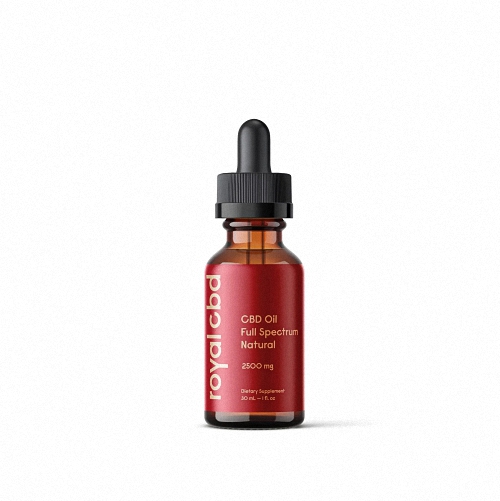CBD Oil for Alzheimer’s & Dementia: How to Use & Dosage

Hemp and CBD oil were federally legalized with the 2018 Farm Bill, but scientists have been researching cannabidiol and its potential benefits for many years prior to the cannabis boom.
CBD products are gaining popularity at a rapid pace, mainly due to the number of conditions potentially alleviated by this compound.
Researchers are discovering new symptoms that CBD may be able to treat or help with in some way — from anxiety to inflammation and neurodegenerative diseases like dementia. CBD may provide relief to thousands of people across the country.
In this article, I’ll dive specifically into the potential application of CBD for dementia and the collateral damage it does to individuals suffering from this disease.
I want to explain the ins and outs of using CBD oil, how it can interact with dementia, and guide you through the brands that currently offer the best CBD products on the market.
Best CBD Oils for Dementia
Not all CBD is made equal. In fact, there’s a large degree of difference when it comes to the quality of ingredients in different CBD oils.
If you’re using this supplement for dementia, it’s important to find something clean and as high quality as possible — preferably in a higher potency.
Here are my top 4 recommended products that meet those requirements:
1. Royal CBD
Get 15% off all Royal CBD products. Use code “CFAH” at checkout.
Pros:
- Royal CBD uses organic hemp from local farmers
- The company makes its products with supercritical CO2 extraction
- Available as full-spectrum CBD and isolate
- Four potency strengths to choose from: 250mg, 500mg, 1000mg, and 2500mg
- The oil is potent — it contains up to 83.3 mg of CBD in each mL
- Suspended in premium MCT oil for better taste and improved absorption
- Every batch of product has been tested for potency and purity in a 3rd-party laboratory
Cons:
- The 2500 mg oil is available only in the unflavored option
- Royal CBD products are slightly more expensive than the competition given the quality of ingredients this company uses
My Thoughts on Royal CBD:
Royal CBD is a rising star of premium CBD oils — offering high-quality products made from organically-grown American hemp. The oil contains the full spectrum of cannabinoids and terpenes, providing the synergy from these compounds and contributing to the higher efficacy of CBD.
Aside from extracting its oil with pressurized CO2, Royal CBD sends each batch of products to independent laboratories for testing. This is used to confirm the potency and purity of every bottle sold.
The oil offers 250 mg to 2500 mg of full-spectrum CBD per bottle, suiting both novice consumers and experienced users or those with more severe symptoms.
I like how this product tastes. Because it’s suspended in high-quality MCT oil, it doesn’t leave that bitter, earthy aftertaste on the tongue. The flavor is masked by nutty rather than earthy notes.
But if you prefer other forms of administration, Royal CBD offers convenient soft gel capsules (25 mg of CBD per piece) and isolate-based gummies (10 mg of CBD per count). These forms may not have the fastest onset but are easier to dose and take on the go.
2. Gold Bee
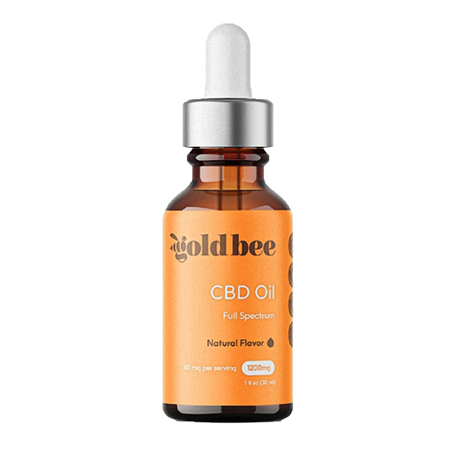
Pros:
- Unique product selection
- Gold Bee uses non-GMO, Colorado-grown hemp
- The oil contains full-spectrum CBD
- The company’s products are extracted with CO2
- You’re getting up to 2400 mg of CBD per bottle
- The oil is sweetened with organic honey
- Third-party lab tested for potency and purity
Cons:
- No low-strength oils
- Not available in-store
My Thoughts On Gold Bee:
This company is a true individual among other CBD brands. For Gold Bee, honey is the name of the game. Coming from the superfoods industry, Gold Bee’s founders have decided to combine two ancient therapeutic ingredients: cannabinoids from organic hemp and honey sourced in Brazillian rainforests. Gold Bee offers full-spectrum CBD oil (sweetened with honey), high-potency capsules, gummies, and delicious honey sticks. All products are non-GMO, vegan, and 3rd-party tested for potency and purity.
The Gold Bee CBD oil comes in two concentrations, packing 1200 mg or 2400 mg of CBD per bottle. A single serving of this oil contains 40 mg of full-spectrum CBD for the 1200 mg bottle. This means you’re getting the synergistic effects provided by cannabinoids, terpenes, and other natural compounds found in hemp. Surprisingly for a whole-plant extract, this product has a subtle flavor thanks to the infusion in MCT oil. As a result, the oil is also more available for the body to process. There are also two flavored versions available (kiwi, and lychee); it contains natural flavorings and is sweetened with honey, doing a great job at masking the earthy taste of natural CBD oil.
For me, this product is definitely a go-to mood booster and anxiety reliever. While it’s not the most potent CBD oil out there, it can easily compete with stronger products that are often priced higher.
3. CBDPure
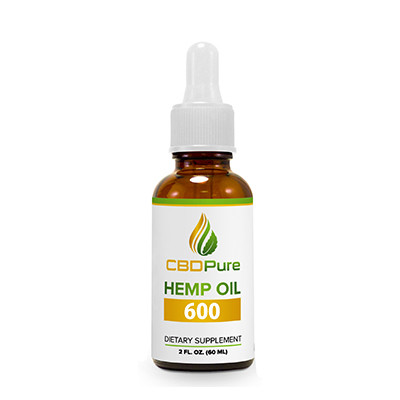
Pros:
- CBDPure’s products are sourced from organic hemp grown in Colorado
- The company uses CO2 extraction in all their products
- The oil is sold in larger bottles than the competition (60 mL)
- These products are made with full-spectrum hemp extract
- The entire product lineup has been tested in an independent laboratory for quality assurance
Cons:
- Narrow product range
- The oil is less potent than Royal CBD
- No isolates available
My Thoughts on CBDPure:
If you don’t know where to start and need plenty of information about each stage of the CBD oil manufacturing stage, CBDPure is one of the best brands you can choose. This company is very transparent and uses organic hemp in every product they offer.
Similar to Royal CBD, CBDPure prefers to keep things simple, offering two types of products — oil drops and capsules.
Their CBD oil comes in 60 mL bottles but is slightly less potent than Royal CBD, so you may choose this option if you benefit from lower doses, which isn’t common for people with dementia symptoms.
If you want a product that will give you more CBD and offer consistent dosing, you may go for CBDPure softgels. Each capsule comes with 25 mg of full-spectrum cannabidiol.
4. CBDistillery
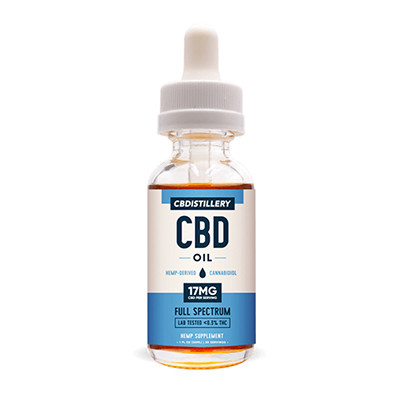
Pros:
- CBDistillery uses Colorado-grown hemp
- The company’s products are available as ‘full-spectrum’ or ‘pure oil’ (zero THC)
- Broad product selection
- The oil is very potent — up to 5,000 mg of CBD per bottle
- CBDistillery sends samples of their CBD oil to a third-party laboratory for thorough content analysis
- It’s one of the most affordable brands on the market
Cons:
- Their hemp isn’t organic
- The CBD oil is available only in the unflavored version
My Thoughts on CBDistillery:
CBDistillery is a Colorado-based brand with a diverse product selection. Out of all their products, my favorite is their full-spectrum CBD oil. Interestingly, this product is also available as pure oil, with no THC inside.
The oil comes in a wide potency range, from 250 to 5,000 mg of total CBD. The company caters to different types of CBD consumers and budgets.
Their oil may not be as high quality as Royal CBD or CBDPure — it’s not made from organic hemp — but this is well justified by the cost of their products. CBDistillery doesn’t sell the best CBD oil out there, but that’s definitely the best CBD oil in this price range.
On top of making affordable CBD products, CBDistillery is known for its influence on raising awareness about the health benefits of cannabis. They have created the #CBDMOVEMENT hashtag to provide education for customers in their social media.

What is Dementia?
Dementia is not a disease, per se. Instead, it’s a group of conditions that impair the functioning of your brain.
Generally, dementia is characterized by the deterioration of at least two important brain functions, such as weakened judgment and memory loss. As a matter of fact, any form of dementia can compromise cognitive functioning.
As with every health condition, there are certain symptoms that can help diagnose dementia, namely:
- Impairment of motor functions and coordination
- Memory loss usually noticed first by a close family member
- Personality changes
- Difficulty with problem-solving or reasoning
- Anxiety, agitation, depression, or paranoia
- Confusion
- Hallucinations and awkward behavior
- Problems handling complex tasks
Is Dementia the Same as Alzheimer’s Disease?
Alzheimer’s is the most common form of dementia, so dementia is just a category that Alzheimer’s Disease belongs to. Yet, there are other forms of dementia besides Alzheimer’s.
Dementia can be categorized into four different forms of dementia:
- Frontotemporal dementia: the type where the nerve cells in the temporal and frontal lobes of the brain degenerate. Frontotemporal dementia affects the parts of the brain that control behavior, language, and personality
- Lewy Body Dementia: the most common type of progressive dementia, Lewy Body Dementia occurs when abnormal clumps of protein start to form in the brain.
- Vascular Dementia: it’s the second most prevalent form of dementia. It’s caused by the damage in the blood vessels that limits direct blood supply to the brain and may lead to blood vessel clogs or stroke.
- Mixed dementia: it typically involves some combination of Alzheimer’s Disease and other forms of dementia. While Alzheimer’s may strike those over the age of 65, mixed dementia occurs upon further progression.

What Are the Benefits of CBD for Dementia?
CBD has been proposed by scientists as a natural alternative for many serious conditions including memory loss conditions, anxieties, and sleep disorders.
CBD is a potent antioxidant, anti-inflammatory, and neuroprotectant, so it may greatly affect brain functioning, which is essential in slowing and halting the progression of neurodegenerative diseases.
Below I explain how CBD oil could improve different forms of dementia based on the latest scientific findings.
1. Alzheimer’s Disease
Research shows a clear link between CBD and the reduction of inflammation and brain cell decline.
Inflammation increases the negative impact of Alzheimer’s disease. It’s a core cause of this condition. The more inflamed the brain, the greater the damage.
Alzheimer’s sufferers often show a path of rapid decline and degeneration of brain cells in certain regions. Scientists have recently found that CBD has the potential of improving the plasticity of the hippocampal region — the part of the brain responsible for cognitive functioning and forming memories.
In clinical trials, researchers have found that the endocannabinoid system is involved in neurotransmission, neuropathology, and neurobiology of different forms of dementia, including Alzheimer’s Disease.
2. Vascular Dementia
As mentioned, people who have vascular dementia typically encounter problems with planning, reasoning, memory, judgment, and other thought processes due to brain damage from reduced blood flow to their brains.
A 2016 study conducted by the National Institute of Health (NIH) found that activating cannabinoid receptors in the brain promoted the recovery of blood flow to the brain.
3. Parkinson’s Disease Dementia
Parkinson’s is a progressive neurodegenerative disease mainly affecting middle-aged and elderly people. Some symptoms of dementia may be the result of Parkinson’s disease — referred to as Parkinson’s disease dementia.
Scientists suggest that Parkinson’s disease may derive from lowered dopamine production and is most commonly expressed by muscular strains, tremors, and slow, flawed movement.
A digestive imbalance may also be a significant factor in the progression of Parkinson’s and the seriousness of its symptoms. Cannabinoids such as CBD have been shown to produce neuroprotective and antioxidant effects on the brain which, along with its anti-inflammatory properties, can be effective in managing Parkinson’s disease-induced dementia.
4. Lewy Bodies Dementia
Lewy Bodies is a scientific name for the alpha-synuclein protein deposits in the brain. These buildups can lead to problems with judgment, sleeping, behavior, movement, and mood.
Research has found that CBD may reduce anxiety and stabilize mood. In addition, the anti-inflammatory effects of CBD can reduce the severity of motor symptoms and help with sleep regulation.
5. Frontotemporal Dementia
As the brain loses more cells in its frontal or temporal lobes, this can trigger symptoms of depression and psychosis. Unlike many antipsychotic drugs, CBD may alleviate tremors, anxiety, and rigidity without the side effects associated with prescription drugs.
6. Huntington’s Disease Dementia
Also known as Huntington’s chorea, this disease is an inherited disorder that leads to degeneration of brain cells — which often results in symptoms of dementia.
The earliest symptoms of this condition are often mild and involve problems with mood and concentration. As the disease progresses, a person may suffer from a general lack of coordination and an unsteady gait (walking motion).
A 2016 study conducted by researchers from the University of Madrid discovered that CBD’s antioxidant and anti-inflammatory properties can be beneficial for managing Huntington’s disease and is safe even at very high doses.
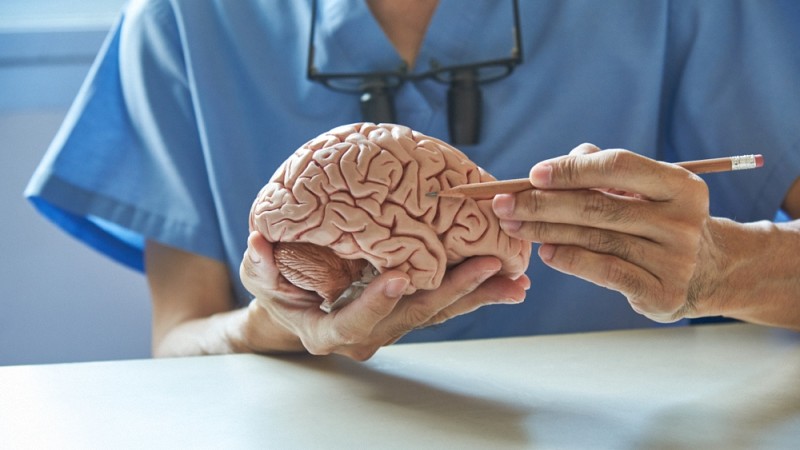
What Experts Say About CBD Oil and Dementia
Scientists are going to use a CBD/THC oral spray Sativex to treat dementia patients in the first major trial in the UK. The study is led by researchers at King’s College London and funded by Alzheimer’s Research UK.
Researchers will be investigating the efficacy of Sativex, a drug already approved for patients with multiple sclerosis, by observing 60 patients between the age of 55–90 who are living in care homes for the duration of the trial. The study will aim at easing aggression and agitation, one of the main symptoms of dementia.
Dag Aarsland, a psychiatrist and the professor supervising the trial says:
“Most often, people associate Alzheimer’s disease with memory problems, but this is just one aspect of a complex condition that can affect people in different ways. Many people with Alzheimer’s can become agitated or aggressive, and this can pose difficulties for the person with the condition and those closest to them.”
If full-spectrum extracts prove effective as a dementia treatment, this can be a breakthrough for modern medicine considering that scientists have been struggling to come up with effective solutions for almost two decades.
“With no new dementia treatments in over 15 years, it is vital that we test a wide range of approaches to find effective ways to help people living with the condition,” said David Reynolds, Ph.D., of Alzheimer’s Research U.K. Reynolds underlines the importance of finding a medicine that will not only slow or stop the progression of dementia but also benefits people’s day-to-day performance.
“Based on some preliminary studies in other populations, like younger individuals with bipolar disorder and schizophrenia, as well as animal studies, there is at least some reason to theorize these drugs would have a benefit,” follows Dr. Nathan Herrmann, head of geriatric psychiatry department at Sunnybrook Health Sciences Centre in Canada, showing support for his colleagues in the UK.
Sativex has equal amounts of THC and CBD. Hemp-derived CBD oil contains only 0.3% THC and there are no trials that would look into the effects of this cannabis solution on dementia.
What’s the Best CBD Oil Dosage for Dementia?
There are no definite dosage guidelines when it comes to using CBD oil for dementia. However, various studies have been performed on the efficacy of different CBD doses for Alzheimer’s patients.
A study conducted in 2014 found that higher concentrations of CBD may be required until the effects take hold. The study was conducted on transgenic mice.
Given the lack of regulation in the CBD marketplace, the best thing you can do is observe the effects of different dosages and report to a foundation or science institute that specializes in seeking new forms of dementia treatment. With more self-reports from patients, healthcare professionals will be able to come up with some general guidelines for people with dementia in the future.
Where to Buy CBD Oil for Dementia
If you’ve been considering taking hemp-derived CBD oil for dementia, you can buy one in a local cannabis dispensary or search for CBD products online.
I prefer buying CBD oil online. The majority of CBD supplements are sold this way, so you get access to a wider range of products. Cannabis dispensaries have plenty of CBD supplements as well, but they may not carry the best products out there, not to mention that they might have stood on the shelves for a long time after arrival — which is not the best way to store CBD oil.
Buying CBD oil online is also more convenient. You can easily check the reputation of your potential supplier. Always make sure that your manufacturer uses organic hemp, makes its products with CO2 extraction, and posts testing results from 3rd-party laboratory screening.
Finally, online stores are less expensive than dispensaries. Usually, you will pay around twice as much for CBD oil in a local dispensary than you would for a product ordered online.
It’s worth waiting the extra 2-3 days to get exactly what you’ve been looking for without spending an arm and a leg.
Final Thoughts on Using CBD Oil for Dementia
Dementia is a severe neurodegenerative condition. It’s not a disease per se; instead, it’s a set of symptoms that describe a predictable set of symptoms. It can take many forms, from Alzheimer’s Disease to vascular dementia and Lewy Bodies Dementia. Dementia can also result from the progress of other neurodegenerative diseases, such as Parkinson’s or Huntington’s Disease.
Scientists have been investigating the neuroprotectant properties of CBD and its influence on neurodegeneration for quite some time now. While the evidence isn’t conclusive yet, results from animal studies and preclinical trials indicate that the endocannabinoid system and cannabinoids can be used to prevent neurodegeneration and reverse its impact with consistent administration.
If you’re interested in trying CBD oil for dementia, make sure to contact your doctor first to figure out whether CBD is good for you, especially if you’re already using some medication.
References:
- Prenderville, J. A., Kelly, Á. M., & Downer, E. J. (2015). The Role of Cannabinoids in Adult Neurogenesis. British Journal of Pharmacology, 172(16), 3950–3963.
- Walther, S., & Halpern, M. (2010). Cannabinoids and Dementia: A Review of Clinical and Preclinical Data. Pharmaceuticals (Basel, Switzerland), 3(8), 2689–2708.
- Karl, T., Cheng, D., Garner, B., Arnold, J.C. (2012). The Therapeutic Potential of the Endocannabinoid System for Alzheimer’s Disease. Expert Opinion on Therapeutic Targets, 16(4), 407–420.
- Benyo, Z., Ruisanchez, E., Leszl-Ishiguro, M., Sandor, P., Pacher, P. (2016). Endocannabinoids in Cerebrovascular Regulation. American Journal of Physiology. Heart and Circulatory Physiology, 310(7), 785–801.
- Peres, F. F., Lima, A. C., Hallak, J., Crippa, J. A., Silva, R. H., & Abílio, V. C. (2018). Cannabidiol as a Promising Strategy to Treat and Prevent Movement Disorders?. Frontiers in pharmacology, 9, 482.
- Ibeas Bih, C., Chen, T., Nunn, A. V., Bazelot, M., Dallas, M., & Whalley, B. J. (2015). Molecular Targets of Cannabidiol in Neurological Disorders. Neurotherapeutics : the journal of the American Society for Experimental NeuroTherapeutics, 12(4), 699–730.
- Maroon, J., & Bost, J. (2018). Review of the Neurological Benefits of Phytocannabinoids. Surgical Neurology International, 9, 91.
- Lopez-Sendon Moreno, J.L. et al. (2016). A Double-Blind, Randomized, Cross-Over, Placebo-Controlled, Pilot Trial With Sativex in Huntington’s Disease. Journal of Neurology, 263(7), 1390–1400.
- Cheng, D., Spiro, A.S., Jenner, A.M., Garner, B., Karl, T. (2014). Long-term Cannabidiol Treatment Prevents the Development of Social Recognition Memory Deficits in Alzheimer’s Disease Transgenic Mice. Journal of Alzheimer’s Disease, 42(4), 1383–1396.
